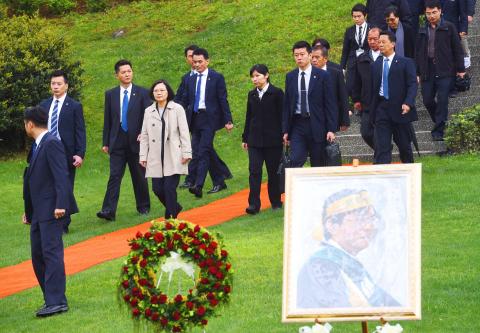President Tsai Ing-wen (蔡英文) yesterday stressed the importance of transitional justice, saying that it is the most important step following the democratization of Taiwan.
It is important the nation gets transitional justice right, Tsai said at an event hosted by the Deng Liberty Foundation at Chinpaoshan Cemetery (金寶山) in New Taipei City to commemorate democracy activist Deng Nan-jung (鄭南榕).
“While the world already associates Taiwan with democracy, there is one missing element, namely achieving transitional justice,” she added.

Photo: Peter Lo, Taipei Times
“The process — which is rooted in uncovering the truth, taking responsibility and social reconciliation — is one her administration has long championed,” she added.
The Legislative Yuan passed the Act on Promoting Transitional Justice (促進轉型正義條例) in December last year. It requires the government to set up a committee to implement transitional justice measures.
The first thing the transitional justice promotion committee would do once established is research what happened when the then-Chinese Nationalist Party (KMT) regime governed the nation under martial law from 1945 until 1992, Tsai said.
The appointed committee nominees are to undergo legislative review before their confirmation.
The committee measures up to the transitional justice teams of other nations, Tsai said, adding that she looks forward to lawmakers’ support of its members.
“Whether Taiwan could be a democratic nation was something Deng cared about deeply,” Tsai said, adding that he would likely find it comforting knowing that Taiwan was ranked among the world’s “free” nations this year in Freedom House’s annual report, in which Taiwan garnered an aggregate score of 93 out of 100, up two points from last year.
On April 7, 1989, Deng, then editor-in-chief of Freedom Era Weekly (自由時代週刊), set himself alight as heavily armed police attempted to break into his office following 71 days of self-imposed isolation after he was charged with sedition for the stance his magazine took against the government after it published a draft Taiwan Republic Constitution in 1988.
In 2016, the Executive Yuan declared April 7 Freedom of Expression Day to commemorate Deng’s death.

Tropical Storm Gaemi strengthened into a typhoon at 2pm yesterday, and could make landfall in Yilan County tomorrow, the Central Weather Administration (CWA) said yesterday. The agency was scheduled to issue a sea warning at 11:30pm yesterday, and could issue a land warning later today. Gaemi was moving north-northwest at 4kph, carrying maximum sustained winds near its center of up to 118.8kph and gusts of 154.8kph. The circumference is forecast to reach eastern Taiwan tomorrow morning, with the center making landfall in Yilan County later that night before departing from the north coast, CWA weather forecaster Kuan Shin-ping (官欣平) said yesterday. Uncertainty remains and

SEA WARNING LIKELY: The storm, named Gaemi, could become a moderate typhoon on Wednesday or Thursday, with the Taipei City Government preparing for flooding A tropical depression east of the Philippines developed into a tropical storm named Gaemi at 2pm yesterday, and was moving toward eastern Taiwan, the Central Weather Administration (CWA) said. Gaemi could begin to affect Taiwan proper on Tuesday, lasting until Friday, and could develop into a moderate typhoon on Wednesday or Thursday, it said. A sea warning for Gaemi could be issued as early as Tuesday morning, it added. Gaemi, the third tropical storm in the Pacific Ocean this typhoon season, is projected to begin moving northwest today, and be closest to Taiwan on Wednesday or Thursday, the agency said. Today, there would likely

DISRUPTIONS: The high-speed rail is to operate as normal, while several airlines either canceled flights or announced early departures or late arrivals Schools and offices in 15 cities and counties are to be closed today due to Typhoon Gaemi, local governments announced last night. The 15 are: Taipei, New Taipei City, Taoyuan, Tainan, Keelung, Hsinchu and Kaohsiung, as well as Yilan, Hualien, Hsinchu, Miaoli, Chiayi, Pingtung, Penghu and Lienchiang counties. People should brace for torrential rainfall brought by the storm, with its center forecast to make landfall on the east coast between tonight and tomorrow morning, the Central Weather Administration (CWA) said. The agency issued a sea warning for the typhoon at 11:30pm on Monday, followed by a land warning at 11:30am yesterday. As of

CASUALTY: A 70-year-old woman was killed by a falling tree in Kaohsiung as the premier warned all government agencies to remain on high alert for the next 24 hours Schools and offices nationwide are to be closed for a second day today as Typhoon Gaemi crosses over the nation, bringing torrential rain and whipping winds. Gaemi was forecast to make landfall late last night. From Tuesday night, its outer band brought substantial rainfall and strong winds to the nation. As of 6:15pm last night, the typhoon’s center was 20km southeast of Hualien County, Central Weather Administration (CWA) data showed. It was moving at 19kph and had a radius of 250km. As of 3pm yesterday, one woman had died, while 58 people were injured, the Central Emergency Operation Center said. The 70-year-old